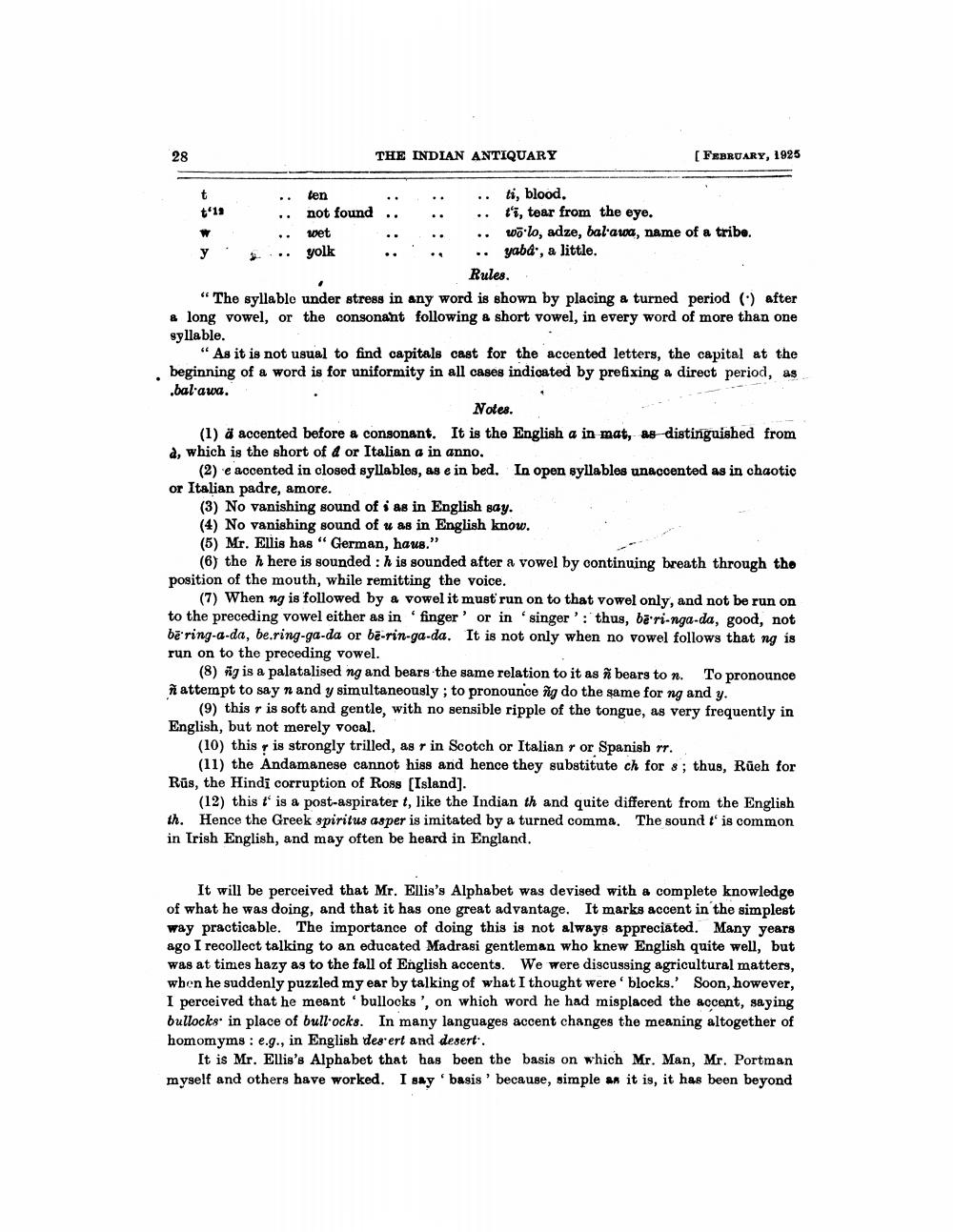________________
28
t
t'19
W
y
ten
not found
wet yolk
THE INDIAN ANTIQUARY
[ FEBRUARY, 1925
ti, blood.
t'i, tear from the eye.
wo lo, adze, balawa, name of a tribe. yaba, a little.
Rules.
"The syllable under stress in any word is shown by placing a turned period () after a long vowel, or the consonant following a short vowel, in every word of more than one syllable.
"As it is not usual to find capitals cast for the accented letters, the capital at the beginning of a word is for uniformity in all cases indicated by prefixing a direct period, as .bal awa.
Notes.
(1) ä accented before a consonant. It is the English a in mat, as distinguished from à, which is the short of d or Italian a in anno.
(2) e accented in closed syllables, as e in bed. In open syllables unaccented as in chaotic or Italian padre, amore.
(3) No vanishing sound of i as in English say.
(4) No vanishing sound of u as in English know.
(5) Mr. Ellis has "German, haus."
(6) the h here is sounded: h is sounded after a vowel by continuing breath through the position of the mouth, while remitting the voice.
(7) When ng is followed by a vowel it must run on to that vowel only, and not be run on to the preceding vowel either as in finger or in singer': thus, bari-nga-da, good, not bering-a-da, be.ring-ga-da or be-rin-ga-da. It is not only when no vowel follows that ng is run on to the preceding vowel.
(8) g is a palatalised ng and bears the same relation to it as a bears to n. To pronounce attempt to say n and y simultaneously; to pronounce ng do the same for ng and y.
(9) this r is soft and gentle, with no sensible ripple of the tongue, as very frequently in English, but not merely vocal.
(10) this is strongly trilled, as r in Scotch or Italian r or Spanish rr.
(11) the Andamanese cannot hiss and hence they substitute ch for 8; thus, Rueh for Rus, the Hindi corruption of Ross [Island].
(12) this t is a post-aspirater t, like the Indian th and quite different from the English th. Hence the Greek spiritus asper is imitated by a turned comma. The sound t' is common in Irish English, and may often be heard in England.
It will be perceived that Mr. Ellis's Alphabet was devised with a complete knowledge of what he was doing, and that it has one great advantage. It marks accent in the simplest way practicable. The importance of doing this is not always appreciated. Many years ago I recollect talking to an educated Madrasi gentleman who knew English quite well, but was at times hazy as to the fall of English accents. We were discussing agricultural matters, when he suddenly puzzled my ear by talking of what I thought were blocks.' Soon, however, I perceived that he meant bullocks', on which word he had misplaced the accent, saying bullocks in place of bullocks. In many languages accent changes the meaning altogether of homomyms: e.g., in English desert and desert.
It is Mr. Ellis's Alphabet that has been the basis on which Mr. Man, Mr. Portman myself and others have worked. I say basis' because, simple as it is, it has been beyond




